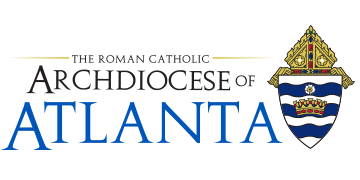Goals and Philosophy Of the Religion Curriculum
Christ-Centered Nature of Catechesis Built on the Gifts Inherently Given to Each Child as They are Made in the Likeness and Image of God.
Every member of the faculty and staff of the Archdiocese of Atlanta Catholic Schools serves as a Catechist, echoing by the way in which they live the calling and teachings of Jesus Christ. Through the Holy Spirit, we strive to make lifelong, intentional disciples of all who participate in our programs: students, parents, volunteers and staff.
The mission of the Office of Catholic Schools (OCS) is to assist the Archbishop of Atlanta in one of his primary responsibilities of safeguarding and defending the teachings of the Roman Catholic Church. The OCS lives this mission most directly by envisioning, certifying, and evaluating the particular catechetical policies and initiatives used within our Religious Education Programs as well as our Academic Course of Study. As a policy document, the Graded Course of Study is therefore a pathway by which we aim to bring all “in communion with Jesus Christ: only He can lead us to the love of the Father in the Spirit and make us share in the life of the Holy Trinity.”
Overview of Graded Course of Study
The Graded Course of Study articulates the content for the systematic, evangelizing Catechesis for students grades Pre-K through 12. It was promulgated by the Archdiocese of Cincinnati, January, 2018, updated and revised by the Archdiocese of Atlanta, 2023. It is to be followed by those responsible for catechesis in Catholic schools.
The Graded Course of Study was developed and organized in light of the Catechism of the Catholic Church, The National Directory for Catechesis, and the teachings of Pope John Paul II’s Theology of the Body. Most learning objectives reference and are indexed to the Catechism of the Catholic Church.
The Academic standards for all courses in all grade levels is built from content area’s National Associations with the Graded Course of Study (The Religion Curriculum) as it’s foundation. Most importantly knowing that each child who enters our door is made in the image and likeness of God, our faculty and staff is confident that they each come with their own unique gifts. It is our job to nurture those gifts that will help them excel and go beyond expectation.
Parents and Family as Primary Teachers of Faith
The OCS recognizes that the parents and family are the “first heralds“ of their children’s catechesis; they are the primary and principal educators of their child’s Christian faith. The family, not the school, is in fact the “domestic Church.” Faith-sharing by parents therefore “precedes, accompanies, and enriches all forms of catechesis.” It is a goal of our program to continually share and engage parents and family in our catechesis of their children.
Instructional Method
In order to teach effectively the content of this Graded Course of Study, we recommend teachers and catechists use the catechetical process described below. Jesus himself appears to have followed a similar method when he spoke to the two disciples on the road to Emmaus (Luke 24: 12-35). It consists of four steps. Textbook companies often follow the same four steps calling them by different names, but the basic structure of the lesson remains the same. The method chosen must always clearly show the relationship between doctrine and living as Christian disciples.
- Human Experience – Begin with the students’ own experiences. Help them to become aware of the ways that the theme of a particular lesson affects their lives. Explore its different aspects, checking understanding often, and how it relates to their concerns. Useful methods for this step are discussions, personal reflection, analysis, simulation games, and videos. Starting with the personal experience creates in children an openness to receive the message. It assists them in understanding the relevance of the teaching and connect with the heart and mind, leading to full engagement.
- Revealed Message – What has God said about this message? How do Sacred Scripture and the teachings of the church enlighten the children’s understanding of their experience? Some helpful methods are Scripture study, storytelling, role playing. Teaching focuses on providing information, aligning what is essential for growth and development and what the learner needs to know.
- Discovery – This part of the lesson gives students time to make the message/doctrine their own, to assimilate the truth or value, to discover how this learning could change their lives if they believe and live it. Some helpful methods are guided meditation, personal sharing, journaling, reading high quality children’s literature. Teaching encourages the student to reflect.
- Response – Helping students make the teaching relevant to their lives. How do they feel about it? How will they respond to what God is asking of them? This step also includes a community celebration of the interior discovery. Appropriate methods are singing, liturgical celebrations, prayer services, creative arts and crafts, service projects, community improvement projects, and using new learning as a scaffold to deeper or more challenging thinking. Teaching is reverent.

